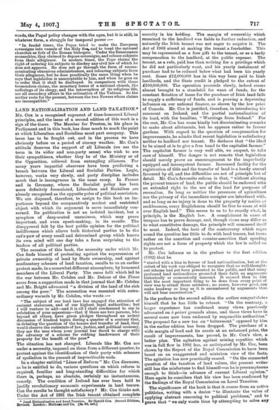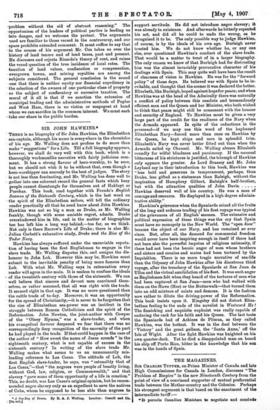LAND NATIONALISATION AND LAND TAXATION.*
Mn. Cox is a recognised exponent of time-honoured Liberal principles, and the issue of a second edition of this work is a sign of the times. The Member for Preston, in his place in Parliament and in this book, has done much to mark the point at which Liberalism and Socialism must part company. This issue has to be fought out, and in the process we have obviously before us a period of stormy weather. Mr. Cox's attitude deserves the support of all Liberals (we use the term in its wider and non-party sense) who wish to see their sympathisers, whether they be of the Ministry or of the Opposition, relieved from entangling alliances. For many years impartial observers have been predicting a breach between the Liberal and Socialist Parties. Logic, however, works very slowly, and party discipline includes much that is incongruous in the same camp. In France and in Germany, where the Socialist policy has been more definitely formulated, Liberalism and Socialism are already recognised as the opposite poles of political conviction. We are disposed, therefore, to assign to this book an im- portance beyond the comparatively modest and restricted object with which its argument is more immediately con- cerned. Its publication is not an isolated incident, but a symptom of deep-seated uneasiness, which may prove important, and even epoch-making, in its results. The disapproval felt by the best public opinion for the political indifference which allows both historical parties to be the cat's-paw of every small and determined group which knows its own mind will one day take a form surprising to the leaders of all political parties.
The occasion of this book, the necessity under which Mr. Cox finds himself of protesting against the supersession of private ownership of land by State ownership, and against confiscatory schemes of land taxation, recalls to us an earlier protest made, in a somewhat different atmosphere, by honoured members of the Liberal Party. The ensue belli which led to the war between Mr. Cobden and Mr. Delano of the Times arose from a suggestion made in that journal that Mr. Cobden and Mr. Bright advocated "a division of the land of the rich among the poor." The accusation was resented with extra- ordinary warmth by Mr. Cobden, who wrote :— " The subject of our land laws has engaged the attention of eminent statesmen, and of our highest legal authorities ; but I will venture to add—and it is all I shall condescend to say in refutation of your aspersions—that if there are two persons, who beyond all others, have given pledges throughout an ardent discussion of kindred topics during a quarter of a century that, in debating the question of the tenure and transfer of land, they would observe the restraints of law, justice, and political economy, they are the men whom your journal has dared to charge with the advocacy of a scheme for robbing landowners of their property for the benefit of the poor.'
The situation has not changed. Liberals like Mr. Cox are under a necessity, imposed on them from a different quarter, to protest against the identification of their party with schemes of spoliation in the pursuit of impracticable ends.
In a chapter entitled "Lines of Reform " Mr. Cox discusses, as he is entitled to do, various questions on which reform is required, familiar and long-standing difficulties for which there is, perhaps, no absolute, certainly no instantaneous, remedy. The condition of Ireland has ever been held to justify revolutionary economic experiments in land tenure. Can the results be thought satisfactory P Mr. Cox thinks not. Under the Act of 1881 the Irish tenant obtained complete
• Land Nationalisation and Land Taxation. By Harold Cox. Second Edition, Revised. London: Methuen sad Co. Da dd. natl security in his holding. The margin of ownership which remained to the landlord was liable to further reduction, and naturally the Irish tenant was not eager to acquire it. The Aet of 1903 aimed at making the tenant a freeholder. This may be represented as a free gift to the tenant, or as a tardy compensation to the landlord, at the public expense. The tenant, as a rule, paid less than nothing for a privilege which he did not particularly want, and his yearly instalment of purchase had to he reduced below what had been his yearly rent. Some £12,000,000 has in this way been paid to Irish landlords, and the State credit is pledged to the extent of £100,000,000. The operation proceeds slowly, indeed seems almost brought to a standstill for want of funds, for the constant flotation of loans for the purchase of Irish land fails to supply a sufficiency of funds, and is proving a depressing influence on our national finance, as shown by the low price of Consols. Mr. Cox is justified, therefore, in introducing his comment on Ireland, and the partial nationalisation of its land, with the headline, " Warnings from Ireland." For the rest, Mr. Cox has some kindly but discriminating remarks to make about allotments, but he appears rather to favour gardens. With regard to the question of compensation for improvements, he admits that recent legislation is satisfactory neither to landlord nor tenant. He declares that "the ideal to be aimed at is to give a free hand to the capitalist farmer." The capitalist farmer is very well able, we suspect, to take care of himself. The danger is not remote that legislation should merely prove an encouragement to the imperfectly equipped and incompetent farmer. Increased facility for the registration of title and the transfer of land is a hardy annual favoured by all, and the difficulties are not of principle but of detail. Mr. Cox's favourite reform is that, " without altering the present tenure of land, the public should be endowed with an extended right to the use of the land for purposes of recreation. So long us neither the processes of agriculture nor the privacy of the immediate occupier are interfered with, and so long as no injury is done to the property by malice or recklessness, every Englishman should be free to roam at will over English land." This seems to us to be exactly what, in principle, is the English law. A complainant in cases of trespass has to prove damage, and, though views may differ as to what constitutes damage, the principle will commend itself to most. Indeed, the heat of the controversy which rages round the question has little to do with laud tenure, but turns rather on the assertion and counter-assertion that sporting rights are not a form of property which the law is called on to protect.
Mr. Cox informs us in the preface to the first edition (1892) that he "started with a bias in favour of land nationalization, but at the outset of his work was obliged to recognise that no well-thought- out scheme had yet been presented to the public, and that many professed land nationalizers grounded their faith on arguments historically or economically unsound. It seemed then to him that the most important thing to be done from every point of view was to attack these mistakes ; no cause, however good, can make headway so long as it is encumbered by arguments that will not bear examination."
In the preface to the second edition the author congratulates himself that he has little to retract. "On the contrary, a larger experience has confirmed many views previously advocated on a priori grounds alone, and those views have in several cases now been endorsed by responsible authorities." The proposal for a new tax on " betterment" opposed by him in the earlier edition has been dropped. The purchase of a wide margin of land and its resale at an enhanced price, the result of improvements, has proved, in Mr. Cox's view, a better plan. The agitation against mining royalties which was in full flow in 1902 has, as anticipated by Mr. Cox, been shown by the Report of the Royal Commission to have been based on an exaggerated and mistaken view of the facts. The agitation has now practically ceased. " On the connected question of the taxation of land values, the present writer still has the misfortune to find himself—as he is presumptuous, enough to think—in advance of current Liberal opinion." Here again he considers that his view has been confirmed by the findings of the Royal Commission on Local Taxation.
The significance of the book is that it comes from an active politician, writing with a desire "to illustrate the value of applying abstract reasoning to political problems," and to prove that " we only waste time by attempting to solve any -problem without the aid of abstract reasoning." The opportunism of the leaders of political parties is leading us into danger, and we welcome the protest. The arguments used are familiar to those versed in the controversy, and our space prohibits extended comment. It must suffice to say that in the course of his argument Mr. Cox takes us over the history of land tenure and of land taxes, past and present. He discusses and rejects Ricardo's theory of rent, and raises the vexed question of the true incidence of local rates. The taxation of land values, confiscation or compensation, overgrown towns, and mining royalties are among the subjects considered. The general conclusion is the sound one that there is neither equity nor financial expediency in the selection of the owners of one particular class of property as the subject of confiscatory or excessive taxation. The moral of it all is that if we sanction the extension of municipal trading and the administrative methods of Poplar and West Ham, there is no victim or scapegoat at band whom we can sacrifice in the common interest. We must each take our share in the public burden.















































 Previous page
Previous page